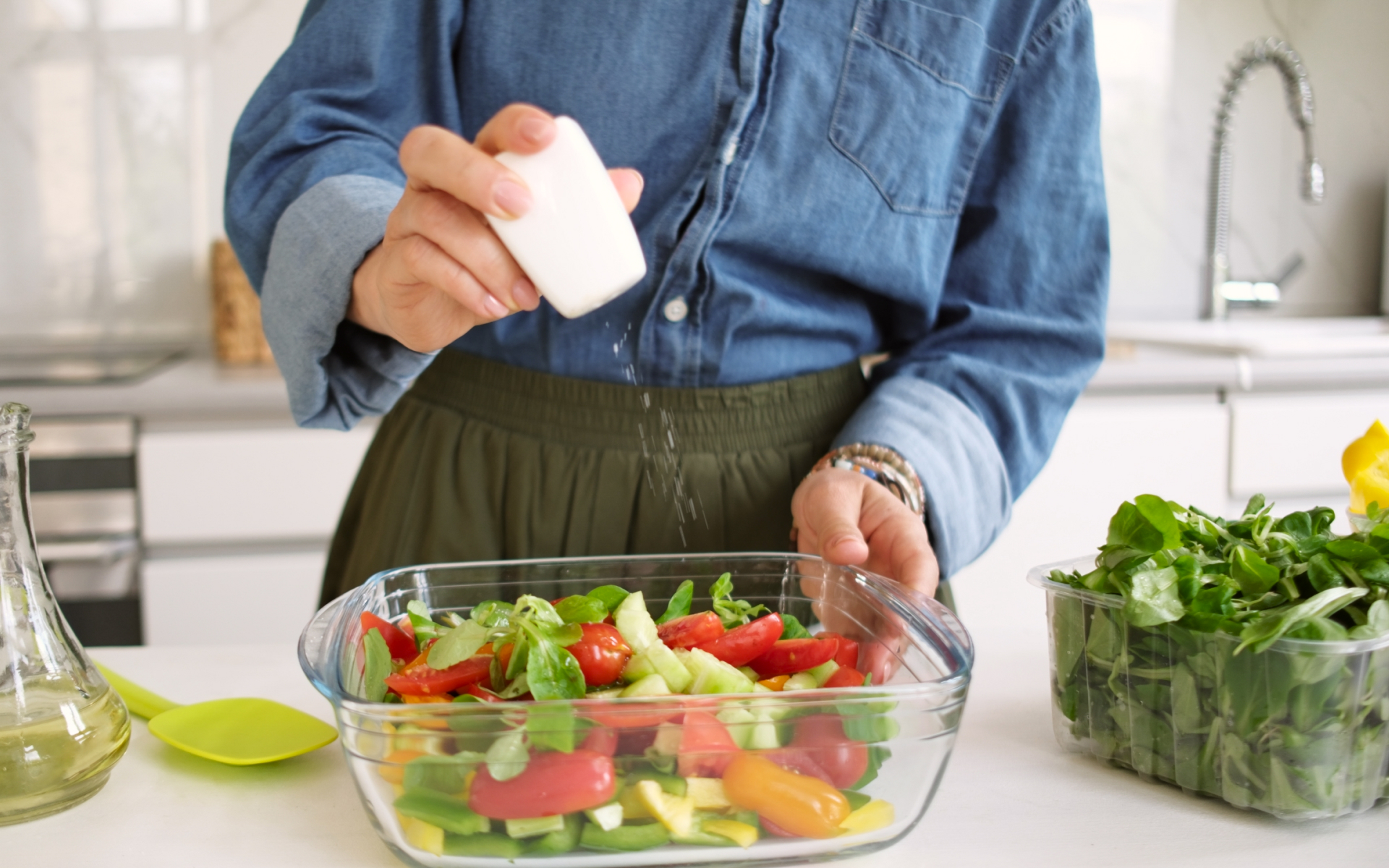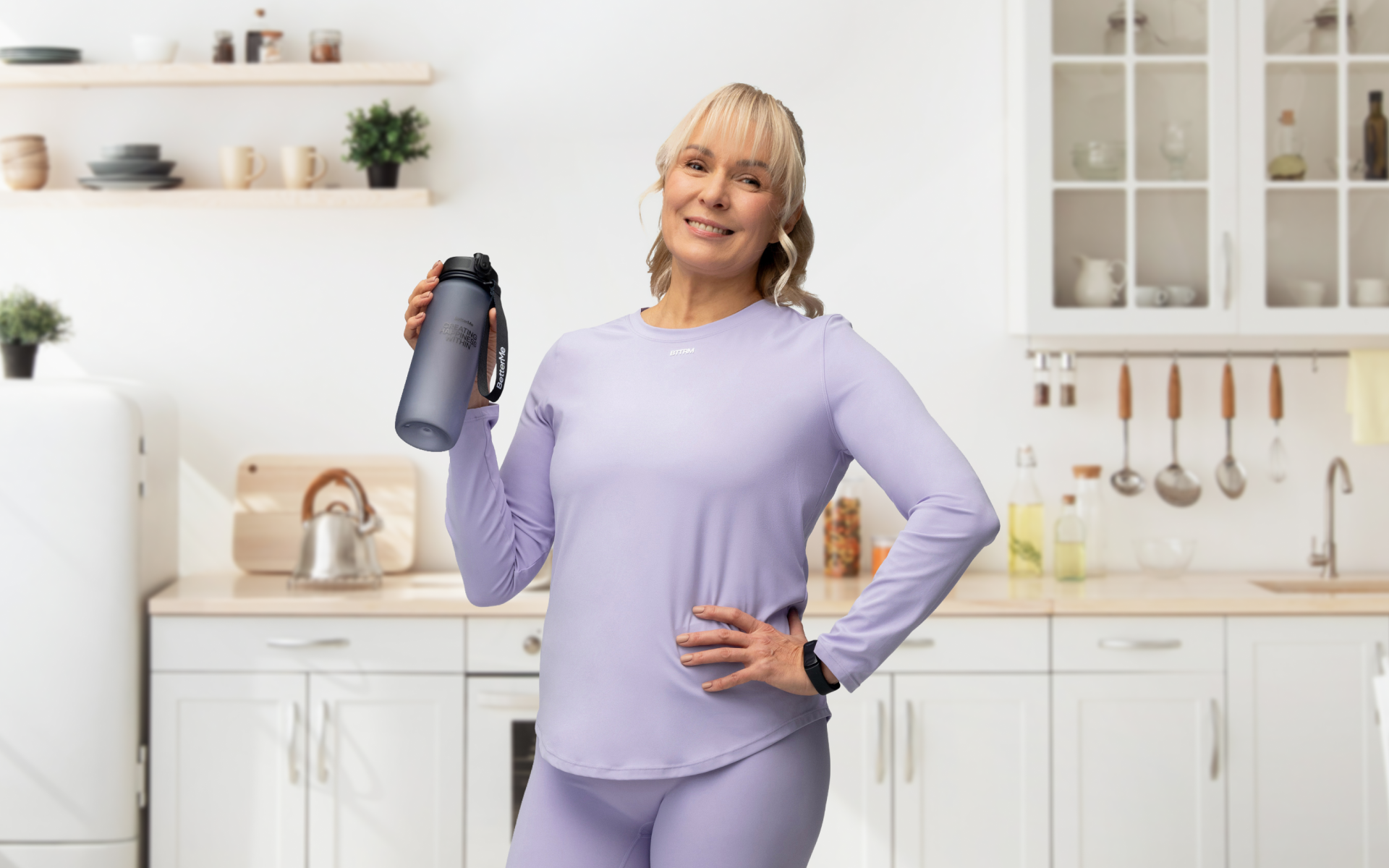Obesity in seniors is strongly linked with an increased risk of chronic conditions such as diabetes, heart disease, and certain types of cancer. It can also exacerbate existing health issues and lead to decreased mobility and quality of life (1).
Effective weight management can significantly improve health outcomes for seniors with chronic conditions. For example, a moderate weight loss of 5-10% of body weight can lead to improvements in blood sugar control and cardiovascular health (2).
Weight management also plays a vital role in mitigating mobility issues, as maintaining a healthy weight can reduce the strain on joints and enhance overall physical function (3).
Seniors over 70 may consider using intermittent fasting as a weight management strategy. Intermittent fasting involves alternating periods of eating and fasting, the most popular method being the 16/8 schedule, where individuals fast for 16 hours and eat within an 8-hour window (4).
While intermittent fasting has gained popularity in recent years, there is limited research on its effects in seniors over 70.
Here’s what seniors over 70 need to know about intermittent fasting and its safety.
What Is Intermittent Fasting for Seniors over 70?
For seniors over 70, and all adults, intermittent fasting involves limiting food intake to certain periods of the day or week. This can range from fasting for 12 hours and eating within a 12-hour window daily to more extended periods of fasting on specific days of the week.
The idea behind intermittent fasting is that by restricting calorie intake during specific times, you end up eating less overall, and your body is forced to use stored fat for energy instead of constantly relying on incoming calories. This can lead to weight loss and potentially improve overall health outcomes for seniors, but it’s not the only way to reduce calorie intake or lose weight.
Is Intermittent Fasting Safe for Seniors over 70?
Intermittent fasting is generally considered safe for many seniors over 70, as long as it’s done correctly and under the guidance of a healthcare professional. However, there are some considerations to keep in mind before starting intermittent fasting as a senior.
Existing Health Conditions
Seniors with underlying health conditions should consult their doctor before they start intermittent fasting. This includes those who are taking medications that require food intake at specific times or have chronic conditions such as diabetes or heart disease. These individuals may need to adjust their medication schedules and closely monitor their health while fasting, and in some cases, fasting may not be feasible or safe.
Nutrient Needs
As we age, our nutrient needs change (5), and it can be more challenging to meet these needs when following a restricted eating pattern such as intermittent fasting. Seniors over 70 should ensure they consume enough nutrients, particularly protein and key vitamins and minerals, during their eating windows. Consulting a registered dietitian can help ensure you meet your needs.
Dehydration
Seniors are already at an increased risk of dehydration due to age-related changes in the body (6). Fasting can further increase this risk, so seniors over 70 must drink plenty of water during their eating window to remain hydrated.
Reasons why BetterMe is a safe bet: a wide range of calorie-blasting workouts, finger-licking recipes, 24/7 support, challenges that’ll keep you on your best game, and that just scratches the surface! Start using our app and watch the magic happen.
Energy Levels
As individuals age, they often experience fluctuations in energy levels. Intermittent fasting may affect energy availability throughout the day, which can be particularly concerning for seniors who need consistent energy for daily activities. It’s essential to monitor how fasting affects overall energy and adjust the fasting schedule if necessary to maintain optimal activity levels.
Bone Health
Maintaining bone density is essential for seniors over 70 to prevent fractures and osteoporosis (7). Intermittent fasting may impact calcium and vitamin D intake if dietary planning isn’t adjusted during feeding periods. Seniors should ensure they consume adequate amounts of these nutrients to support bone health (8) or consider supplements if advised to do so by a healthcare professional.
Social and Psychological Impact
Food is often a significant part of social interactions and personal routines and changes in eating patterns may affect these aspects of a senior’s life. Intermittent fasting may require adjustments to social eating habits or daily routines, which can be challenging.
Seniors should consider the social implications of their fasting schedules and seek support from family or friends to maintain mental and emotional well-being. No diet or weight loss strategy should interfere with your ability to live a quality, fulfilling, well-rounded life.
Read more: Navigating Intermittent Fasting Stages: Beyond the Basic Knowledge
What Is the Best Intermittent Fasting for a 70-Year-Old?
The best intermittent fasting schedule for a 70-year-old should be individualized and consider any existing health conditions or medication regimens. It’s recommended to consult a healthcare professional when choosing an intermittent fasting plan.
For seniors over 70, it may be beneficial to start slowly and gradually increase the length of fasting periods. This can help the body adjust and reduce potential side effects such as fatigue or dizziness.
Below are some potential fasting schedules for seniors over 70 to consider:
- Time-Restricted Fasting: This method involves limiting food intake to specific windows each day, such as the popular 16/8 schedule. This approach may be easier for seniors to follow, as it doesn’t involve full-day fasts.
- 5:2 Fasting: This approach involves eating regularly five days a week and restricting calorie intake to 500–600 calories on two non-consecutive days. This method could be an excellent option for seniors who want more flexibility in their eating schedule, but it’s not appropriate for everyone.
- Alternate Day Fasting: This involves fasting every other day and eating normally on non-fasting days. As this method involves longer periods of fasting, it may be more challenging for seniors over 70.
How Many Hours Should a 70-Year-Old Woman Fast to Lose Weight?
A 70-year-old woman should fast for as many hours as she is comfortable with and can safely maintain. Weight loss on any intermittent fasting schedule will vary based on individual factors such as overall calorie intake, activity levels, and underlying health conditions.
To get an idea of how many hours she may need to fast to lose weight, a 70-year-old woman should:
- Start with a time-restricted fasting schedule, such as the 16/8 method, and see how her body responds.
- Gradually increase fasting periods by an hour or two at a time as far as she feels comfortable.
- Ensure calorie intake during eating windows is sufficient to support nutrient needs and overall health.
- Consult a healthcare professional for personalized recommendations based on individual needs and goals.
Remember, the most important factor for weight loss is a calorie deficit (burning more calories than consuming) (9), and intermittent fasting can be a helpful tool in achieving this deficit.
However, it’s not the only way to create a calorie deficit and lose weight – you can eat three meals a day and still lose weight by making healthier food choices and increasing physical activity. The best approach is to find a sustainable eating pattern that works for you and supports your overall health and well-being.
How Many Calories Should a 70-Year-Old Woman Consume a Day to Lose Weight?
A 70-year-old woman who is looking to lose weight should aim for a moderate calorie deficit, rather than severe restriction.
The exact number of calories needed will vary based on individual factors, but generally speaking, women over 70 should consume around 1,600-2,000 calories per day to maintain weight (10). Your individual needs will vary based on factors such as body size and activity level. To lose weight, it’s recommended to reduce this intake by 300-500 calories per day.
However, it’s essential to ensure these calories come from nutrient-dense foods and support overall health. Seniors over 70 should focus on consuming enough protein (around 25 grams per meal 11) and key vitamins and minerals during their eating windows.
It’s also important to listen to your body and adjust accordingly if you experience any adverse effects or difficulties with fasting. Consulting a healthcare professional can also provide personalized recommendations for calorie intake and nutrient needs.
BetterMe is your fast-track ticket to long-lasting weight loss! Tailor your fitness journey and maximize your results with just a couple of swipes!
What Is the Fastest Way to Lose Weight After 70?
The fastest way to lose weight after 70 isn’t a one-size-fits-all approach. It’s essential to find what works best for you and your body.
Here are some general tips for safe and effective weight loss in seniors over 70:
- Focus on creating a modest calorie deficit through diet, exercise, or a combination of both.
- Choose nutrient-dense foods that support overall health and provide adequate protein intake (around 25 grams per meal).
- Stay hydrated by drinking plenty of water throughout the day, particularly during fasting periods if you choose to try intermittent fasting.
- Regularly engage in physical activity, such as walking, strength training, or yoga. Consult a healthcare professional for exercise recommendations based on your current health status.
- Prioritize rest and recovery to support your body’s natural healing processes.
- Consult a healthcare professional before you start any new diet or exercise regimen.
How Can a 70-Year-Old Woman Lose Belly Fat?
A 70-year-old woman can lose belly fat by creating a calorie deficit through diet and/or exercise. A combination of both dietary changes and physical activity is often the most effective approach for weight loss (12).
Some specific strategies to target belly fat include (13):
- Reducing overall calorie intake by choosing nutrient-dense foods and reducing added sugars and unhealthy fats.
- Incorporating strength training exercises that focus on core muscles to help tighten and tone the abdominal area.
- Engaging in moderate-intensity aerobic exercise, such as brisk walking or cycling, which can help burn fat throughout the body, including the abdomen.
- Being mindful of portion sizes and avoiding overeating during eating windows if following an intermittent fasting schedule.
You should bear in mind that spot-reduction, or losing fat in one specific area of the body, isn’t possible. Weight loss will occur gradually and may vary based on individual factors. It’s important to be patient and consistent with healthy habits to see results over time.
Read more: 3 Best Exercises to Lose Belly Fat After 50 for Women
What Is the Best Diet for a 70-Year-Old Woman to Lose Weight?
A well-researched diet that is likely beneficial for a 70-year-old woman who is aiming to lose weight is the Mediterranean diet. This diet is rich in fruits, vegetables, whole grains, and healthy fats such as olive oil, and it includes moderate consumption of fish and poultry.
Research has shown that the Mediterranean diet may improve cardiovascular health, help maintain cognitive function, and support weight management in seniors. Its emphasis on nutrient-dense foods and healthy fats makes it particularly suitable for older adults (14).
To eat a Mediterranean-style diet, you can:
- Include plenty of plant-based foods such as fruits, vegetables, and pulses in your meals.
- Choose whole grains such as brown rice, quinoa, and whole-wheat bread over refined grains.
- Consume healthy fats such as olive oil, avocado, nuts, and seeds in moderation.
- Enjoy fish and poultry a few times per week instead of red meat.
Another diet option for weight loss in seniors is the DASH (dietary approaches to stop hypertension) diet, which emphasizes whole foods and limits ultra-processed and high-sodium foods (15).
This diet has been shown to improve overall health and reduce the risk of chronic diseases (15), which makes it a suitable choice for seniors who are looking to lose weight healthily.
To eat a DASH-style diet, you can:
- Focus on consuming whole foods such as fruits, vegetables, and whole grains.
- Limit ultra-processed and high-sodium foods such as fast food, frozen dinners, and salty snacks.
- Choose lean protein sources such as fish, poultry, beans, and legumes.
- Use herbs and spices to flavor meals instead of salt.
Ultimately, finding a sustainable and nutrient-rich eating pattern that works best for your body and lifestyle is the key to successful weight loss at any age.
The 5:2 diet is a form of intermittent fasting where individuals eat normally five days a week and significantly reduce their calorie intake on the other two days, which aren’t back-to-back (16). For seniors, the 5:2 diet can be adapted by ensuring the low-calorie days still include nutrient-rich foods to meet their dietary needs. It’s important for seniors to consult a healthcare provider before they start the diet to ensure it is aligned with their nutritional requirements and overall health. A 1,200-calorie diet may be sufficient for some 70-year-old women, particularly if they have a smaller body size and lower activity level. However, it’s essential to ensure these calories are nutrient-dense to meet the body’s needs for vitamins, minerals, and protein. Seniors should work with a dietitian or healthcare provider to determine their specific caloric needs based on their health status, activity level, and weight goals. Black coffee, without added sugars or cream, typically doesn’t break intermittent fasting. It contains minimal calories and can be consumed during fasting periods. However, adding sugar, milk, or cream can introduce calories that may disrupt the fasting state. Seniors should consider how coffee affects their digestion and hydration, particularly when consumed on an empty stomach (17). Yes, you can eat bananas on a 5:2 diet. On fasting days, it’s important to manage portion sizes and ensure that your total caloric intake remains within your target. Bananas are nutrient-rich and can be an excellent source of energy and potassium (18), but they should be consumed in moderation to fit within the calorie limits of a fasting day. Balancing them with other low-calorie, nutrient-dense foods will help maintain nutritional balance.Frequently Asked Questions
What is the 5:2 diet for seniors?
Is 1,200 calories enough for a 70-year-old woman?
Does coffee break intermittent fasting?
Can you eat bananas on a 5:2 diet?
Conclusion
Intermittent fasting can be a safe and effective weight management strategy for seniors over 70, but it’s essential to consider individual needs and potential risks before starting. Seniors should consult their doctor before they begin intermittent fasting and make any necessary adjustments based on their health status.
With proper guidance and monitoring, intermittent fasting may offer numerous benefits for seniors, including weight loss and improved overall health outcomes. So, if you’re a senior over 70 who is looking to manage your weight, consider speaking to your healthcare professional about the potential benefits of incorporating intermittent fasting into your lifestyle.
DISCLAIMER:
This article is intended for general informational purposes only and does not serve to address individual circumstances. It is not a substitute for professional advice or help and should not be relied on for making any kind of decision-making. Any action taken as a direct or indirect result of the information in this article is entirely at your own risk and is your sole responsibility.
BetterMe, its content staff, and its medical advisors accept no responsibility for inaccuracies, errors, misstatements, inconsistencies, or omissions and specifically disclaim any liability, loss or risk, personal, professional or otherwise, which may be incurred as a consequence, directly or indirectly, of the use and/or application of any content.
You should always seek the advice of your physician or other qualified health provider with any questions you may have regarding a medical condition or your specific situation. Never disregard professional medical advice or delay seeking it because of BetterMe content. If you suspect or think you may have a medical emergency, call your doctor.
SOURCES:
- Health Risks of Overweight & Obesity (2023, niddk.nih.gov)
- Weight Loss and Improvement in Comorbidity: Differences at 5%, 10%, 15%, and Over (2017, ncbi.nlm.nih.gov)
- Determinants of Bone Health (2004, ncbi.nlm.nih.gov)
- Intermittent Fasting: Exploring Approaches, Benefits, and Implications for Health and Weight Management (2024, npjournal.org)
- Nutritional and lifestyle management of the aging journey: A narrative review (2023, frontiersin.org)
- Hydration Status in Older Adults: Current Knowledge and Future Challenges (2023, ncbi.nlm.nih.gov)
- What Is Bone Density? A Practical Guide for Older Adults (2024, ncoa.org)
- Calcium and Vitamin D: Important for Bone Health (2023, niams.nih.gov)
- Optimal Diet Strategies for Weight Loss and Weight Loss Maintenance (2021, ncbi.nlm.nih.gov)
- Dietary Guidelines for Americans (2020, dietary guidelines.gov)
- Protein Requirements and Recommendations for Older People: A Review (2015, ncbi.nlm.nih.gov)
- Eating & Physical Activity to Lose or Maintain Weight (2023, niddk.nih.gov)
- Weight loss – a healthy approach (2024, betterhealth.vic.gov.au)
- Mediterranean diet and health in the elderly (2024, ncbi.nlm.nih.gov)
- DASH Dietary Pattern: A Treatment for Non-communicable Diseases (2020, ncbi.nlm.nih.gov)
- A randomised controlled trial of the 5:2 diet (2021, ncbi.nlm.nih.gov)
- Effects of Coffee on the Gastro-Intestinal Tract: A Narrative Review and Literature Update (2022, ncbi.nlm.nih.gov)
- Are Bananas Good for You? (2023, health.clevelandclinic.org)











